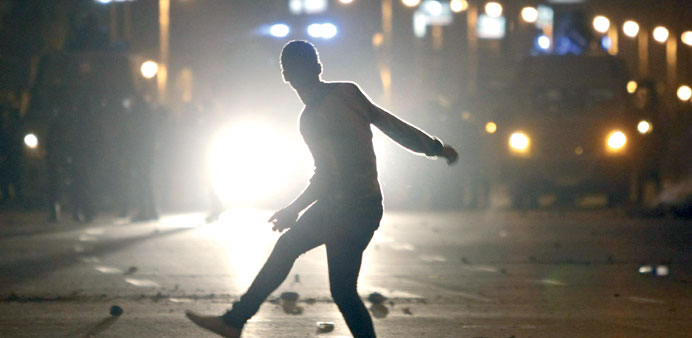A protester, who opposes Egyptian President Mohamed Mursi, throws stones at riot police, during clashes in front of the presidential palace in Cairo earlier this week.
Tom Perry /Reuters
Egypt’s Islamist-led government approved a draft law on demonstrations yesterday that backers say meets international democratic standards but critics believe will give the state too much power to stifle protest.
The bill will be sent to the Shura council, the upper house of parliament, which currently has sole legislative power during Egypt’s transition to democracy.
“This law has been drafted to restore peace to protests, which are considered to be among the strongest rights granted to the nation,” Justice Minister Ahmed Mekky said, according to the state news agency MENA.
Heba Morayef, Egypt director of Human Rights Watch, countered: “This law seems designed to actually increase restrictions, whereas the existing legal framework, which dates back to the early 20th century, was bad enough. “If one protester commits a crime, it gives the police the right to disperse the entire protest,” Morayef said.
Close to 60 people died in violent protests against President Mohamed Mursi between January 25, the second anniversary of the start of Egypt’s popular uprising, and February 4.
Protests on everything from political rights to economic grievances have become a routine feature of public life in the last two years, prior to which they were severely repressed.
Under the draft law, Mekky said, peaceful protest would be a right that must be protected and this would require formal notification of demonstrations at least three days in advance. Police may order the route of a protest march to be changed.
Morayef said the draft law would give police too sweeping powers to disperse protests, and included unacceptable restrictions on demonstrating within 200m of government buildings, parliament, embassies, courts, places of worship, police stations, courts and military zones.
However, Mekky said the draft gives the police the duty to protect protests. It aims to avoid any confusion between the right of peaceful assembly, which the state is obliged to protect, and acts of aggression against people and property, or obstruction of highways and public facilities.
The authorities would have the right to seek a court injunction banning a demonstration, and the bill would outlaw blocking roads and squares and wearing masks or scarves obscuring the face.
One contentious article would prohibit carrying banners or chanting slogans that include insults, defamation or contempt of “heavenly” religions, or that stir sedition, violence or hatred or include an offence to state bodies and institutions. Visiting US Assistant Secretary of State for Human Rights Michael Posner said on Tuesday that it was important that the Egyptian government “respect international principles of free assembly and association and the critical role civil society plays in any democratic society.”
Thousands of Egyptian riot police and conscripts have gone on strike to demand the interior minister’s resignation, saying he is too close to the country’s Islamist leadership, security sources said yesterday. The Interior Ministry said the walkout was based on an erroneous belief that the government planned to ban demonstrations, pitching the police into confrontation with protesters.
Hamas and Egypt closing Gaza tunnels: official
Gaza’s Hamas rulers have closed hundreds of tunnels running under the territory’s border with Egypt due to health concerns over some smuggled items, an official said yesterday. “Less than 270 tunnels are operating now, down from around 1,200 tunnels in 2010,” the official said on condition of anonymity.
“Many of them were closed down because they were used to smuggle banned materials that harm citizens.”
The Hamas government forbids the importation of drugs and any other items it considers potentially harmful into the Palestinian enclave which is under an Israeli blockade. Another Gaza source said Hamas had closed about 900 tunnels, and a tunnel operator said others were being flooded from the Egyptian side. “The Egyptian security forces pump water into the tunnels which leads to their collapse and closure,” said Abu Samir, owner of a tunnel near the Gaza border town of Rafah.
“There is no work in Gaza,” he said.
“What can we do to live? The tunnels are the most important source of livelihood in Gaza now... no matter how many times they demolish them we will rebuild.”
Abu al-Assad, another tunnel owner, said: “The Egyptians closed down the tunnels twice after the (outbreak of their) revolution but I rebuilt after months because to us it is a matter of life and death.”
Hamas, he added, had allowed tunnels to multiply and issued permits for their use to bring in essential commodities, after the movement seized control of the coastal strip in 2007.
The tunnels have been a vital lifeline for the flow of food, clothes, building materials and fuel into the impoverished territory, which Israel has blockaded since 2006. — AFP

